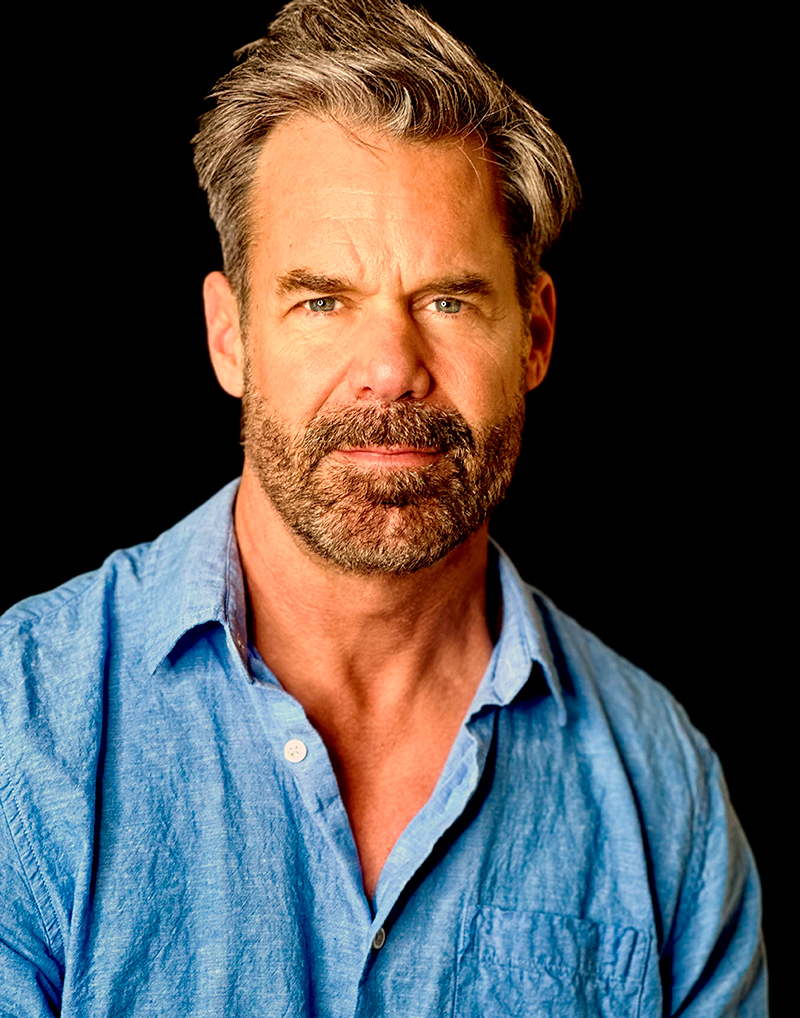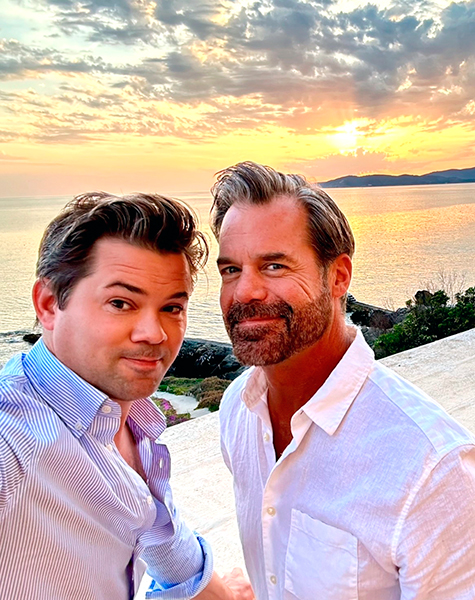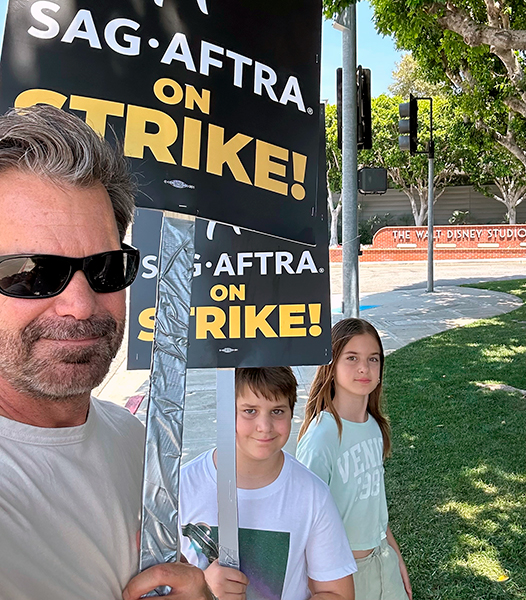
Born at St. Luke’s Hospital in Kansas City and raised in leafy Prairie Village, Tuc Watkins always enjoyed making people laugh but never thought a paying acting career was available to a Midwestern kid like him. Now, after a successful 30-year career in Hollywood and New York in films and TV shows, Watkins is still perhaps best known and loved for his long-running gigs playing David Vickers on One Life to Live and Bob Hunter in Desperate Housewives.
One of his early films, I Think I Do, has just been digitally remastered for a 25th anniversary rerelease on several major streaming platforms. In 2022, Watkins starred in the Netflix comedy Uncoupled, and he is currently working on Paradise City, a new show debuting June 6 on Hulu, and playing a new character in Criminal Minds: Evolution coming late this year or early 2025 on Paramount+.
After Indian Hills Jr. High (now Middle School), Watkins family relocated to St. Louis, where Watkins graduated from Parkway West High school in 1985. He then earned a degree in telecommunications from Indiana University.
Watkins lives in Los Angeles with his 11-year-old twins, a son and daughter. His partner, actor and singer Andrew Rannells, is based in New York but regularly visits and the couple just bought a home together in Los Angeles, which they haven’t moved into yet. Watkins recently spoke with IN Kansas City by phone from his garage “man cave.”
What part of Los Angeles do you live in?
I live in Burbank. It’s fantastic. When I was a kid in Kansas and you watched the game shows, they all said, “Taped in downtown Burbank, California.”
I remember the announcer on Johnny Carson saying, “Live from beautiful downtown Burbank.”
Right! That’s just down the street from where I live.
How long have you lived in California?
I have moved to California, I think, six times. The first time was when I moved here from Kansas City on Oct. 1, 1989. I drove across the state line in my Suzuki Samurai with my futon rolled up in the back. I’ve moved to New York three times. I’ve moved to London once. I moved to Vancouver once. I moved back to Kansas City for three years in 2016. I told everybody Hillary needed my vote in Missouri—and she did. [Laughs]
And in between all those things, I always moved back to LA. So I’ve lived in Los Angeles off and on for over 30 years, this time since 2019.
Where does the name Tuc come from?
My full name is Charles Curtis Watkins III. My father and my grandfather both went by Curt, and when I was little and tried to say “Curt” it came out “Tuc,” and everyone just started calling me Tuc. I sort of named myself by accident.
What kind of a little kid were you?
I would say adventurous. We had a huge, fun, great backyard. My sister, Courtney, our friend Brooke Dillman, who is also an actress in Los Angeles who lived next door to us, and I—we were always out in the yard, in the treehouse, digging up worms, playing kick the can, that kind of thing.
What did your parents do?
My father was in market research for a business and my mother was a freelance photographer.
Did you have aspirations to be in show business from early on?
No. But when I was in high school, I found that my ticket into the inner circle of popular kids was in making people laugh in drama class. It just felt so good, making people laugh, so I always did that in my free time. I was always in the high school play, doing The Pink Panther Strikes Again or Get Smart. But I never really considered as a guy growing up in the Midwest that it was something I could do as a career.
When I was in college, I did a commercial for a bank and they paid me $300, and I thought, “Oh, wow. Maybe I can do this.”
How did you get from college to the first move to California?
I graduated from Indiana University in 1989. I knew I wanted to give acting a shot. I thought I could go to LA, or I could go to New York. New York seemed a little ominous, a little scary. I thought I would rather struggle under the palm trees and near the beaches of sunny Southern California.
So I went home after college. I painted houses, I worked at the Coyote Grill (at the former Mission Center Mall). I did some modeling gigs for band uniforms and automobile tires, and I learned I was a terrible model. I saved $6,000 and moved to Los Angeles that fall.
What was that first year like in California?
I was very lucky. I got a commercial agent pretty quickly. I got the first commercial I auditioned for, which got me into the actor’s union. It was a beer commercial. We shot it on the beach in Malibu. And I thought, “Why does everyone think acting is so hard? This is so easy, and fun.” [Laughs] And then I didn’t work for about a year and settled into the day-in, day-out of the journeyman actor.
It sounds like your decision to amass a cash reserve before moving paid off.
Yeah, I was just talking about this. My kids’ surrogate mom—we’re still friends—has a son who’s 18 and wants to be an actor and the piece of advice I gave to him yesterday, was “Save up some money, so when you go to where you want to go, you’ve got a little bit of a cushion so you can get into an acting class, you can get yourself familiar with the town. Because if it’s not working out after six months, and it usually doesn’t, you don’t have to go back home. You can set yourself up for success. LA’s not going anywhere. New York’s not going anywhere.”

You famously came out in 2013 on Marie Osmond’s talk show, which is hilarious.
[Laughs] Yeah, who comes out on the Marie Osmond Show?
It seems almost subversive. But was your coming out abrupt at that moment, or had it been a longer process of widening the circles of who knew?
That’s a good way of putting it, widening the circles. Because everyone who knows me personally and professionally knew that I was gay, but I had never gone on a talk show or talked about it in a magazine because I didn’t want to potentially narrow the window of opportunity that I had.
So after I had my kids in 2012, I was just so excited about being a dad, and about my kids, and I just wanted to talk about that. And I wasn’t able to talk about it as thoroughly and as honestly as I wanted to if I had to dodge questions about, “Why did you as a single guy have kids through surrogacy?” And I didn’t want my kids to wonder later why I was dodging questions.
So right at that time, Marie Osmond invited me to be on her show, and I said, “Guess what, Marie?”
Have I got a scoop for you.
[Laughs] Exactly.
You became famous as David Vickers in One Life to Live, a character who kept reappearing even after long breaks. Do you feel like David is your straight alter ego?
David’s not really all that straight, if you go back and look at some of the episodes. David was whatever he needed to be to get what he wanted. But there is a whole lot of me in David Vickers.
How so?
I was hired to come on as this cool, mysterious character, and I tried to do that. I was kind of unremarkable at it, and there were guys that were so much better at it than I was. On that kind of show, if you can’t find your own unique stripe on the tapestry, you get lost and you get fired. And I loved that job, and I wanted to stay.
One day, I accidentally fell down the stairs, and everyone laughed, and I was embarrassed, but then I thought, “Oh! My character isn’t cool and mysterious—he thinks he’s cool and mysterious. He’s actually an idiot.” And that’s when the David Vickers that we all came to know and love was born. And that’s what gave him longevity is that he was different from everyone else.
So you’re better at being funny than being cool and mysterious?
Exactly.
Did you worry about being typecast as “only” a soap star?
Yes. One of the things they tell you is that after you get on a soap opera, the first thing you should do is get off the soap opera. So I was aware of that but it was the first big gig I had ever gotten and I loved working on that show. I loved the people I worked with on that show. I love working in a repertory company, that’s why I loved theater, and the soap opera is a great medium for that. So I did that for years and loved every single minute of it.
Naturally you want to go out and do other things, so I would go do other things, but then I would miss it, and I would want to live in New York again, and so they would let me come back from prison in Morocco, or I was unearthed from my grave, and so I got to go back.
In 1997, you starred in I Think I Do, which was a groundbreaking LGBT film. What do you think that film captured about that era in the history of gay civil rights?
What was noteworthy about I Think I Do is it was a gay rom-com, and LGBTQ-themed films of that era were primarily issue-oriented about coming out or age-related issues or hate crimes. We as a community weren’t well represented in comedies. So when that came along, I said, “Yes, please.” I wanted to move the needle in the spectrum of inclusion. I think it let people in on who we are a little more thoroughly.
It was just fun to watch, like any good romantic comedy.
A lot of the other films were so important, but it felt a little like eating health food. And that’s not always why we watch movies. Sometimes we just want to escape or fantasize or laugh.

You went on to do a lot of major characters in TV shows and film. How has work for actors been changing recently and how did the SAG/AFRA strike affect you?
The strike hit everybody really hard: actors, writers, directors, producers. Last spring I was supposed to go do a movie in England, but they foresaw the strike potentially happening, so it got shelved. It shut everything down, and that was coming on the heels of the epidemic, when nobody worked. Starting back up has also taken a long time. Fortunately, I have a couple of gigs that have kicked into full gear.
The good part for me was getting to spend a whole lot of time with my kids, which I have loved. I’m not sure how much they have loved it. I think at their age, it may have created a stronger bond than if I was always off doing something.
Do you think the strike changed anything important?
I think that time will tell. It’s going to be interesting to see what the streamers do because they were producing so much content, and I think we are seeing that that may be a business model that cannot sustain itself. I’m not sure if we’re going to see as much content produced, which is going to be tough on everyone.
You just booked recurring roles on two shows: Paradise City, a new series for Hulu, and a new role on Criminal Minds: Evolution for Paramount+. Can you tell us a little about those roles?
They’re so precious now, they don’t allow you to say much anymore. Everyone thinks they’ve got the next big deal. Paradise City comes from Dan Fogelman, who brought us This is Us. It’s got an incredible cast with Sterling K. Brown and James Marsden. I work closely with Julianne Nicholson, an amazing actress from Mare of Easttown, August Osage County, and The Outsider.
In Criminal Minds: Evolution, I’m playing a not very nice person, which is very exciting. It’s always fun to play baddies.
Acting is grueling. Since you spoke of enjoying extended time with your family during Covid, do you have a vision of retirement or semi-retirement one day?
Actors are not built to retire. We just don’t do it. I feel like the parts I’ve been offered lately are more interesting than ever before, and it feels like it’s ramping up rather than slowing down.
Interview condensed and minimally edited for clarity.


